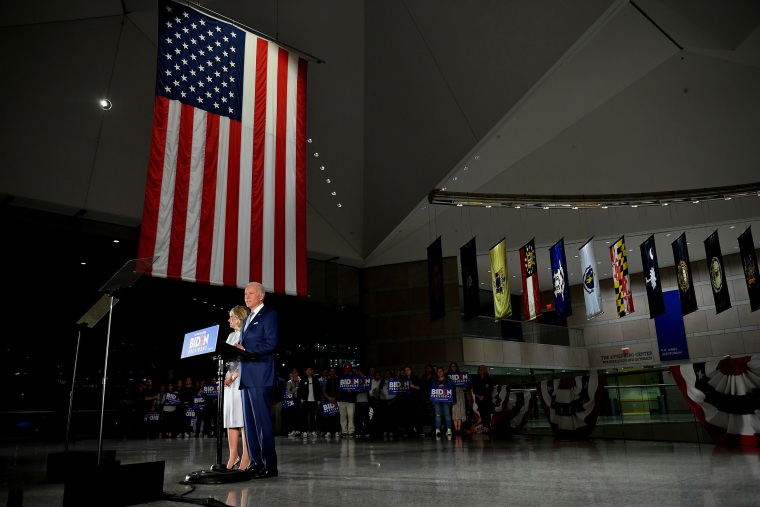With the coronavirus pandemic wreaking havoc on stock markets, sports leagues and everyday life, it comes as no surprise that the presidential race isn't being spared.
Enter: the virtual campaign.
Say goodbye to big rallies with long lines, smaller meet-and-greets, volunteers knocking on your door. All you'll need now to "attend" your favorite candidate's event is an internet-connected device — please do so in your pajamas if you like.
"We're in a moment where I think the requirement of having your face out there for campaigns has perhaps faded a little," said Rick Wilson, a former GOP consultant.
Faced with the very real and rapidly growing fear about the spread of the coronavirus, the remaining candidates — Donald Trump, Joe Biden and Bernie Sanders — are doing everything they can to keep their supporters excited without doing so in the large venues that public health experts say is where the virus can be easily spread.
Biden, the front-runner for the Democratic nomination, announced this week that his campaign had changed all of its scheduled coming campaign events to be "virtual" with no large crowds attending.
That included a previously scheduled event Friday in Chicago and a previously scheduled appearance Monday in Miami. The Chicago event has been recast as a "virtual town hall." (Biden also canceled a campaign event that had been scheduled for Thursday in Tampa, Florida, out of concern for public health and replaced it with a speech on the coronavirus epidemic, which he delivered from his hometown, Wilmington, Delaware, and was broadcast online.)
Full coverage of the coronavirus outbreak
What exactly those coming virtual campaign events will look like isn't clear, but experts said they're very likely to closely resemble a Biden event on Tuesday. Biden canceled a large rally in Cleveland, where he had been expected to revel in wins in primary contests, and instead delivered remarks at the National Constitution Center in Philadelphia.
With a cadre of reporters in front of him, Biden spoke at a podium with just his wife, Jill, at his side. More than 20 feet behind him was a small group of supporters holding signs. Creative camera work made it so it wasn't immediately obvious that Biden wasn't speaking to a large live audience.
The event was made available to supporters via a livestream on the Biden campaign website and was carried by several news networks.
While the shift to the virtual campaign may seem radical and swift, it has actually been years in the making, said Jesse Ferguson, a longtime Democratic strategist who worked for the Hillary Clinton campaign in 2016.
"Over the past few election cycles, more and more of the interaction between campaigns and voters has happened online," he said.
"More and more of the campaign events were being livestreamed and watched online. Campaigns are essentially reaching voters on their computers, tablets and mobile phones as much as they are via school gymnasiums," Ferguson added. "So these changes are just supercharging a phenomenon that had already been happening."
The shift may also help candidates maintain control of their messages and of the events — which can often be disrupted by protesters.
In addition, the Biden campaign said Thursday that all employees at the Philadelphia campaign headquarters and in all field offices across the U.S. will work from home starting Saturday. The campaign also said all campaign offices will be closed to the public.
The Trump campaign, on the other hand, hasn't unveiled any specific plans for virtual campaign events, although campaign communications director Tim Murtaugh told NBC News that because the campaign is "built on data and uses technology to its highest advantages," it is better positioned to "virtually engage voters than any other campaign.”
Download the NBC News app for breaking news and politics
The campaign has in recent days canceled or postponed several events that Trump or surrogates had been scheduled to attend. The White House also said a California fundraiser that first lady Melania Trump had been scheduled to attend next Wednesday had been canceled, and the campaign canceled a "Women for Trump" bus tour that was supposed to have taken place this week in Michigan, Ohio and Pennsylvania, as well as a "Catholics for Trump" event that was to have taken place in Milwaukee next Thursday.
Murtaugh said the Trump campaign was letting staffers work from home.
And Trump Victory, the joint operation between the Trump campaign and the Republican National Committee, said Thursday night that it will shift to "virtual events" for volunteer-oriented gatherings.
The Sanders campaign, for its part, said Thursday that it would no longer hold "large events or door-to-door canvasses, instead moving to digital formats and outreach wherever possible."
Mike Casca, the campaign's communications director, added that the campaign had asked all staff to work from home.
Sanders has already delivered two speeches — one Wednesday about staying in the presidential race and one Thursday about the coronavirus — that had no audiences.
Wilson, the GOP consultant, said it may offer a preview of the future of campaigning.
"There are so many tools now to propagate a livestream, so many tools that give you the capacity to watch on your device, to watch your candidate streaming on your tablet, on your phone," he said. "It gives everyone a chance to connect — and the cost is minimal.
"You may be seeing how the future looks," he added.

